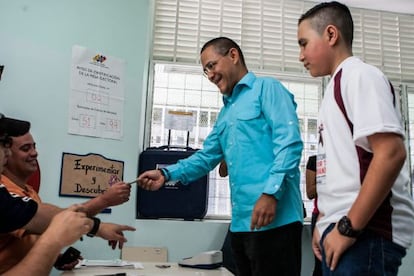“Chavism” broadens its support in local elections
Opposition wins mayoral races in major Venezuelan cities

President Nicolás Maduro’s ruling Socialists won a majority of municipality races on Sunday, disillusioning a baffled opposition which had hoped to use the local elections as a referendum on the current government.
Nevertheless, the Democratic Union Committee (MUD) coalition of opposition parties scored victories in many of the country’s state capitals.
With more than 97 percent of the votes counted, the Unified Socialist Party of Venezuela (PSUV) had obtained 49.24 percent of the votes (about 5.1 million) opposed to 42.72 percent garnered by MUD (some 4.4 million votes).
Despite heavy campaigning by the opposition, voter turnout was poor. Some 58.9 percent of Venezuelans went to the polls compared to a voter turnout of 79.6 percent in the presidential elections on April 14.
Maduro’s governing party, however, broadened its advantage over the opposition by 1.49 percent compared to what was an extremely tight presidential race, the result of which was challenged by MUD candidate Henrique Capriles. Maduro’s predecessor, the late Hugo Chávez, obtained wider margins of victory each time he ran for election over a 15-year period before his death in March. His final victory was also over Capriles, in the presidential election of October 2012.
“They said they would win more votes and I would have to resign,” said Maduro, after the results began trickling in. “They said that this was a plebiscite. What is the MUD leadership going to do following another defeat in 14 months?”
The 51-year-old Maduro pledged to broaden his “economic offensive” to force businesses to cut prices. Earlier last month, he ordered the military to take over a popular appliance chain he accused of price gouging. He also announced price caps on certain consumer goods, including automobiles.
Capriles, the governor of Miranda state, said that he had done “everything humanly possible” to help MUD candidates, and added that Sunday’s results show that Venezuela “is still divided.”
“This country doesn’t have an owner; there is no ruling party or opposition. That is why there is an urgent need for dialogue,” Capriles said.
Of the 24 races that took place in the state capitals, “Chavism” – as the ruling party’s movement is called – captured 15 mayoral seats while the opposition won in the biggest cities, such as Valencia, Barquisimeto and Maracaibo.
Perhaps the most painful loss for the PSUV was in Barinas, the capital of Barinas state where Chávez was born. Opposition candidate José Luis Machín won the mayoral race there with 50.45 percent of the votes.
In the capital Caracas, the opposition maintains control of City Hall with Antonio Ledezma as mayor. However, that mayoral post has been severely weakened since Chávez appointed a government supervisor to oversee the city’s affairs in 2008 following Ledezma’s first victory.
While the vote was carried out peacefully, there were reports of two deaths of ruling party supporters in Aragua state, but the causes of those fatalities remain unclear. Interior Minister Miguel Rodríguez Torres reported 141 crimes committed on Sunday.







































